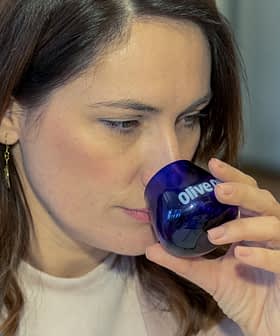Olive oil sensory panels around the world that cannot comply with International Olive Council (IOC) requirements have a new way to gauge their proficiency: the Olive Oil Sensory Panel Proficiency Testing Series by the American Oil Chemists’ Society (AOCS). The new series was developed based on input from the AOCS Olive Oil Expert Panel.
“AOCS does not intend to draw away participants from the established International Olive Council (IOC) sensory proficiency program by creating a competing program,” said AOCS Technical Director Richard Cantrill. “But because olive oil quality is an issue that is important to our membership, we were asked by industry to develop a panel testing series. We anticipate that some panels will join both the IOC and AOCS schemes, thus providing a bridge between the two programs.”
Identification as an AOCS-Recognized Olive Oil Sensory Panel will give the top performing sensory panels an opportunity to demonstrate to olive oil producers, retailers, and importers that they are accurately assessing olive oil quality. Tasting panels are mandated by IOC olive oil standards and are critical in the olive oil industry because they help determine an olive oil’s grade as extra virgin, virgin or lampante.
The importance of olive oil quality standards was highlighted by the North American Olive Oil Association (NAOOA) in a news release. The July 17, 2012, release announced that NAOOA had submitted an updated petition to the US Food and Drug Administration (FDA) calling for a detailed standard of identity for olive oil and olive-pomace oil products.
“The US olive oil industry has made significant progress related to standards in recent years,” said Eryn Balch, NAOOA executive vice president. “This progress sets a solid foundation for application at a nationally mandated level which would provide a smooth route for enforcement.” Connecticut was the first state to adopt a detailed standard of identity for olive oil and olive-pomace oil in 2008, Balch noted in the statement, followed soon after by California. The next year, similar standards were adopted in New York and Oregon. Most recently, the US Department of Agriculture updated its voluntary standard in 2010.
A key feature of all of these standards is the requirement for sensory evaluation, thus increasing the need for proficient sensory panels. The new AOCS sensory proficiency series will consist of two rounds of testing in the first year, with participation dates of October 2012 and January 2013. Each testing round will consist of four samples of 500 milliliters each. Panels will be tested and scored according to IOC guidelines COI/T20/Doc. No 15/Rev. 4 (November 2011). Qualifying panels will be promoted as being AOCS-Recognized Olive Oil Panels.
“In introducing the AOCS program, AOCS recognizes the great value of the work done by IOC in establishing criteria for olive oil sensory analysis, and so we will require that panels use the relevant IOC standards,” added Cantrill. “Calculation of proficiency will also be according to the relevant IOC standards, thus ensuring comparability and transparency.”
“AOCS wishes to act collaboratively with IOC and other proficiency testing entities in providing additional service to help train chemists in both the sensory and chemical analysis of different grades of olive oil,” said Cantrill. “As always, our aim is to improve the level of competence and expertise to the benefit of the oils and fats industry worldwide.”
Enrollment for the October 2012 round of the new program will close on August 20. To register for the proficiency series, visit the AOCS website.








